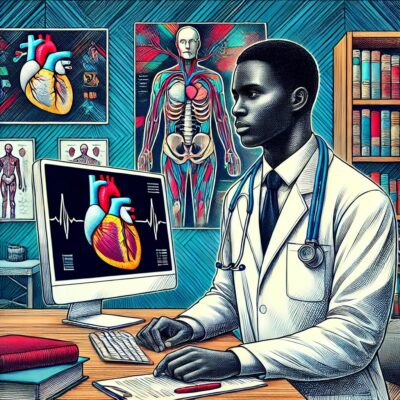Cardiologists specialize in diagnosing, treating, and preventing diseases and conditions of the heart and blood vessels. They manage a wide range of cardiovascular issues, including heart attacks, arrhythmias, and hypertension.
What is a typical day in Cardiology?
– Conducting physical examinations and reviewing patients’ medical histories
– Performing diagnostic tests such as ECGs, echocardiograms, or stress tests
– Prescribing medications and recommending lifestyle changes to manage heart conditions
– Collaborating with surgeons for procedures like stenting or bypass surgeries.
What else might they be expected to do?
– Conduct or participate in research to advance cardiovascular medicine
– Educate patients and their families about managing cardiovascular risk factors
– Train medical students or residents in cardiology practices
What type of training is needed for this career path?
– A Bachelor of Medicine and Bachelor of Surgery (MBChB), typically 5-6 years.
– A residency in internal medicine, lasting 3-4 years, followed by a cardiology fellowship (3 years).
– Certification and licensing by medical boards, such as the Kenya Medical Practitioners and Dentists Council.
What kind of personality is needed to excel in this career path?
– Detail-oriented, analytical, and empathetic individuals thrive in this role.
– Big 5 traits: Conscientiousness and Openness.
– Myers-Briggs types: ISTJ or INTJ often align with this career.
What kind of interests do people in this career path have?
– Passion for understanding and improving heart health (Investigative and Realistic traits).
– Interest in physiology, medical technology, and patient care.
– Interests & Aptitude: Social (S), Investigative (I), and Realistic (R)
Are there any innate skills or aptitudes required?
– Strong analytical skills for interpreting diagnostic results
– Ability to stay calm under pressure in emergency situations
– Communication skills to explain complex medical information to patients
What challenges can I expect to face if I pursue this career path?
– Managing high-pressure environments and critical situations, such as heart attacks
– Dealing with emotionally sensitive cases, particularly end-of-life care
– Keeping up with advancements in cardiology techniques and technology
What are the job prospects for this path in Kenya and Africa? What about International prospects for a Kenyan citizen?
– Kenya and Africa: Cardiologists are in high demand as cardiovascular diseases become more prevalent. Opportunities exist in hospitals, private practices, and teaching institutions.
– International: Cardiologists are highly sought after globally, particularly in developed healthcare systems. Kenyan cardiologists can work abroad after meeting licensing requirements.
What should I focus on if I choose to pursue this career?
– Build a strong foundation in biology, anatomy, and cardiovascular medicine.
– Develop excellent communication and interpersonal skills for patient care.
– Gain practical experience through internships, residencies, and cardiology fellowships.
Which other careers or job roles can I progress to?
– Interventional Cardiologist
– Academic Researcher in Cardiology
– Cardiac Rehabilitation Specialist
– Medical Educator or Trainer
– Healthcare Administrator

